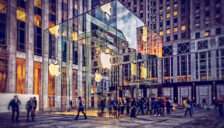Apple Music has started rolling out a “heavy rotation” playlist. From looking at mine, it looks like it’s basically just a bunch of things I’ve played a lot recently.
Read More “Apple Music Debuts “Heavy Rotation” Playlist”Apple Adds Monthly Replay
Apple has updated its Replay website with monthly totals for top artists, albums, songs, and milestones.
Read More “Apple Adds Monthly Replay”Apple Music to Incentivize Spatial Audio Mixes
Benjamin Mayo, writing at 9to5Mac:
Apple will pay up to 10% more per play in royalties for tracks where a spatial version is available. This is starting with January’s payouts. Crucially, Apple Music users do not necessarily have to listen in Spatial Audio for the artist to be rewarded with the bonus payout.
EU Regulating Music Streaming Royalties
The EU has proposed sweeping changes within the music streaming industry to promote smaller artists and make sure underpaid performers are being fairly compensated.
A resolution to address concerns regarding inadequate streaming royalties for artists and biased recommendation algorithms was adopted by members of the European Parliament (MEPs) on Wednesday, highlighting that no existing EU rules currently apply to music streaming services, despite being the most popular way to consume audio.
Apple Offers Reward for Musicians to Use High-End Audio Format
Ashley Carman, writing for Bloomberg:
Apple Inc. is offering incentives to artists and record labels to produce music using a spatial-audio technology that surrounds listeners in sound.
Starting next year, the company plans to give added weighting to streams of songs that are mixed in Dolby Atmos technology, according to people with knowledge of matter. That could mean higher royalty payments for artists who are first to embrace the technology made by Dolby Laboratories Inc., said the people, who asked not to be identified because the change hasn’t been announced.
I’m not a fan of this as long as many Dolby Atmos mixes remain subpar and rushed. I’ve talked to multiple artists in the genre we cover that never even knew their songs were remixed for Atmos and had no say in the matter (and often disliked the mix). I don’t personally turn the setting on for this very reason.
Apple Music Replay
Apple Music’s Replay has been released. I guess December listening doesn’t count?
The End of iTunes?
Soon, all that will be left of the iTunes brand is the iTunes Store for music. And people buy much less music [than] in the past, having mostly shifted to streaming. Will the iTunes name finally fade away as music sales dwindle? It’s hard to imagine Apple stopping digital music sales entirely; even if fewer people buy digital music, the market isn’t dead, not by a long shot. Global digital music sales peaked in 2012 at around $4.4 billion, and in 2021 they had dropped to $1.1 billion. That’s a decline of about 75%, but Apple still earns a hefty amount of money from selling digital music.
Apple Acquires Classical Music Label
More than 80% of the music we listen to today is delivered over streaming, according to figures from last year. But when you look at classical music, it’s been a stubborn hold-out, accounting for just a tiny fraction of that, with just 0.8% of streams (and that’s in the stream-friendly market of the U.S.). Apple’s bet is that this percentage will grow, though, and it wants a piece of that action.
Robert von Bahr, founder of BIS:
We thought long and hard on how to maintain and build upon our prestigious history and looked for a partner who would further our mission, as well as an increased global platform to bring classical music to new audiences all over the world. Apple, with its own storied history of innovation and love of music, is the ideal home to usher in the next era of classical and has shown true commitment towards building a future in which classical music and technology work in harmony. It is my vision and my sincerest dream that we are all a part of this future.
Longplay 2.0 Gets Released
The iOS music app, Longplay, has been released. The developer talks about it more on his blog:
Longplay 1.0 was released in August 2020. I had used the app for years before that myself, but I didn’t know how it would be received by a wider audience. I loved the kind of feedback that I got which helped me distill the heart of the app: Music means a lot to people, and Longplay helps them reconnect with their music library in a way that reminds them of their old vinyl or CD collections. It’s a wall of their favourite albums that has been with them for many years or decades. It’s something personal. The UI very much focussed on that part of the experience, and I wanted to keep that spirit alive, keep the app fun, while adding features that people and myself found amiss.
The main idea behind 2.0 was to focus on the playing of music beyond a single album. 1.0 just stopped playback when you finished an album, but I wanted to stay in the flow – to either play an appropriate random next album or the next from a manually specified queue.
Apple Music Gets “Discovery Station”
Apple Music today gained a new “Discovery Station,” which is located under the “Listen Now” section under Top Picks in the Apple Music app. The customized radio station is paired with the personalized radio station featuring your name, and it has the “Made for You” label. It can also be accessed through this link for those who do not yet see it.
I hit play on mine and the first song was from Cold Years. Not a bad guess.
Apple Adds Concert Discovery Features to Maps
On Maps, more than 40 new Guides, each expertly curated by Apple Music editors, highlight the best venues to experience live music in some of the world’s leading culture hubs. From landmark Viennese symphony halls to cutting-edge techno clubs in Brooklyn and Tokyo, these hand-picked selections — currently spanning over 10 cities — are all music fans need for an unforgettable night out. Apple Music Guides also allow fans to browse venues’ upcoming shows directly from Maps through Shazam’s concert discovery module — part of a suite of features that Shazam introduced last spring, leveraging concert information from the world-renowned event recommendation and artist discovery platform Bandsintown.
Apple Music Classical Coming
Apple Music Classical, a dedicated app for classical music, will be released on March 28th.
Universal Music in Talks With Big Platforms to Overhaul Streaming Model
Universal Music Group is in talks with big streaming platforms to overhaul the industry’s economics and direct more money towards artists, according to people familiar with the matter. The shake-up, which stands to revolutionise the way musicians make money, comes as the world’s largest music company is increasingly concerned about the proliferation of songs on platforms such as Spotify, where 100,000 new tracks are being added each day.
The industry is also contending with growing manipulation of the system, including using bots to inflate listening figures and the uploading of 31-second clips that are just long enough to qualify as a “play”.
iTunes for Windows Being Replaced
Andrew Cunningham, writing at Ars:
Today, as part of a new Windows 11 preview build for Windows Insiders, Microsoft has announced that previews of new Apple Music, Apple TV, and Apple Devices apps are available in the Microsoft Store for download.
The Apple Music and Apple TV apps handle iTunes’ music and video functionality, just as they do on macOS, and provide access to the Apple Music and Apple TV+ subscription services. The Apple Devices app is what you’ll use to make local device backups, perform emergency software updates, sync local media, and the other things you can do with an iDevice that’s plugged into your PC (in macOS, similar functionality was added to the Finder, rather than being broken out into its own app).
Apple Announces Apple Music Sing
Apple today announced Apple Music Sing, an exciting new feature that allows users to sing along to their favorite songs with adjustable vocals and real-time lyrics. Apple Music Sing offers multiple lyric views to help fans take the lead, perform duets, sing backup, and more — all integrated within Apple Music’s unparalleled lyrics experience. Coupled with an ever-expanding catalog that features tens of millions of the world’s most singable songs, Apple Music Sing makes it fun and easy for anyone to participate, however and wherever they choose.
Apple Music Sing will be available later this month to Apple Music subscribers worldwide, and can be enjoyed on iPhone, iPad, and the new Apple TV 4K.






